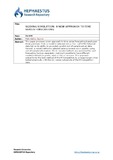| dc.contributor.author | Makridakis, Spyros | |
| dc.date.accessioned | 2015-12-07T15:50:10Z | |
| dc.date.available | 2015-12-07T15:50:10Z | |
| dc.date.issued | 1990-04 | |
| dc.identifier.uri | http://hdl.handle.net/11728/6353 | |
| dc.description.abstract | This paper proposes a new approach to time series forecasting based upon three premises. First, a model is selected not by how well it fits historical data but on its ability to accurately predict out-of-sample actual data. Second, a model/method is selected among several run in parallel using out-of-sample information. Third, models/methods are optimized for each forecasting horizon separately, making it possible to have different models/methods to predict each of the m horizons. This approach outperforms the best method of the M-Competition by a large margin when tested empirically with the 111 series subsample of the M-Competition data. | en_UK |
| dc.language.iso | en | en_UK |
| dc.publisher | Institute for Operations Research and the Management Sciences | en_UK |
| dc.relation.ispartofseries | Journal Management Science;Volume 36 | |
| dc.rights | © 1990, The Institute of Matiagement Sciences | en_UK |
| dc.rights.uri | http://creativecommons.org/licenses/by-nc-nd/4.0/ | en_UK |
| dc.subject | Forecasting | en_UK |
| dc.subject | Time series | en_UK |
| dc.subject | Accuracy measures | en_UK |
| dc.subject | M-Competition | en_UK |
| dc.subject | Sliding simulation | en_UK |
| dc.title | Sliding simulation: a new approach to time series forecasting | en_UK |
| dc.type | Article | en_UK |
| dc.doi | http://dx.doi.org/10.1287/mnsc.36.4.505 | |


